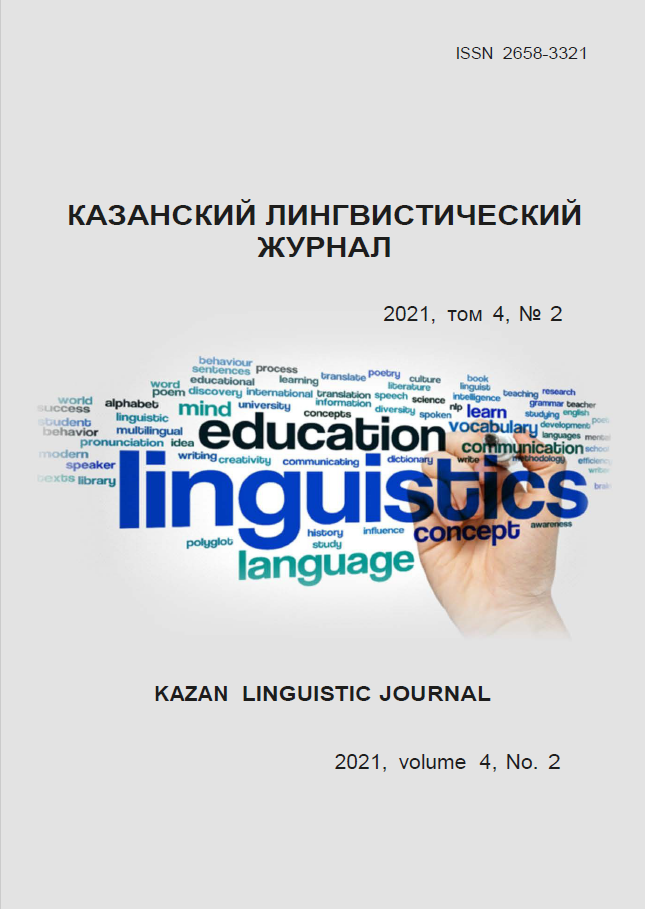Familial relationships between kin languages and etymology of russian вода “water”
Keywords:
water, lead, marine, leak, nipple, pour, sea, utensils, vessel, well, Proto-Indo-European word-stems, the Indo-European theory, alternation theory, sound alternation, etymologyAbstract
The article deals with the problem of defining of familial relationships between the Indo-European languages in relation to the Slavic languages. Analysis of the genealogical tree of the Indo-European languages, and the incipience pattern of the basic stock member вода ‘water’ in the Russian and other Slavic languages, as well as the developmental patterns of water cognates in the other Indo-European languages, and languages from some other language families are given in the present work. The relevance of the topic is determined by inadequacy and obsolescence of the existing etymologies of вода, as well as by insufficient glottochronology. On the basis of the application of the [b(v)/m] alternation and his own matres lectionis alternation the author makes an attempt to introduce his own etymology of the words flowing from the cognate of ‘water’
References
Список литературы
Бэшем А. Чудо, которым была Индия (Basham A.L. The wonder that was India, 1969), пер. с англ., изд. «Наука», 1977 г.
«Имя существительное», пункт 3.3.1, статья в «Лингвокультурологическом тезаурусе» на сайте библиотеки филологического факультета МГУ им. М.В. Ломоносова // URL: http://www.philol.msu.ru/~tezaurus/library.php?view=d&course=1&raz=3&pod=3&par=1 (дата обращения: 02.05.2021).
Нидерле Л. «Славянские древности» (Niederle Lubor “Rukověť slovanských starožitností”), пер. с чешского. Издательство иностранной литературы». Москва, 1956.
Петров С.Ю. «Узбекско-русский словарь Петрова». Барнаул: «Концепт», 2014 г.
«Техника молодежи», журнал, февраль, 1997 г.
«Типы склонения имен существительных в старославянском языке» на Лекции.ком // URL:https://lektsii.com/2-37327.html (дата обращения: 02.05.2021).
Фасмер М. Этимологический словарь русского языка. Москва, «Прогресс», 1986 г.
Черных П.Я. Историко-этимологический словарь русского языка. В 2-х томах. Москва, «Русский язык», 1999 г.
Beekes R. S. P. “Etymological dictionary of Greek”. Leiden, Boston, 2010.
de Vaan M. “Etymological dictionary of Latin and the other Italic languages”, Leiden Indo-European etymological dictionary series, Brill, 2008.
Mallory J.P., Adams D.Q. Encyclopedia of Indo-European culture. Fitzroy Dearborn Publishers, London, 1997.
Matasovic R. “Etymological dictionary of Proto-Celtic”, Leiden, 2009.
“Online etymology dictionary” // URL: https://www.etymonline.com (accessed on: 02.05.2021).
Oppenheim Leo A. (general edition). “The Assyrian dictionary”, 1964 1998.
Orel V., Stolbova O. “Hamito-Semitic Etymological Dictionary. Materials for a reconstruction”, E.J. Brill, 1995.
Pokorny J. “Proto-Indo-European Etymological Dictionary”, revised edition, Dnghu Association, Academia Prisca, 2007.
Ringe D., Taylor A., Warnow T. “Indo-European and Computational Cladistics”, article in “Transactions of the Philological Society”, Vol. 100:1, 2002.
Starostin S. “Turkic Etymology” as published at // URL: https://starling.rinet.ru/cgi-bin/response.cgi?root=config&morpho=0&basename=dataaltturcet&first=1.
Starostin S.A., Dybo A.V., Mudrak O.A. “An Etymological Dictionary of Altaic languages”.
Valpy F.E.J. “An etymological dictionary of the Latin language”. London, 1828.
References
Basham A.L. (1977). The wonder that was India. Transl. from English. Moscow: “Nauka”. (In Russian)
“Noun”, paragraph 3.3.1, an article in the “Linguoculturological Thesaurus” on the website of the library of the philological faculty of Moscow State University. M.V. Lomonosov // URL: http://www.philol.msu.ru/~tezaurus/library.php?view=d&course=1&raz=3&pod=3&par=1 (дата обращения: 02.05.2021). (In Russian)
Niederle L. (1956). Rukověť slovanských starožitností. Transl. from Czech. Foreign Languages Publishing House. Moscow. (In Russian)
Petrov S.Y. (2014). “Uzbeksko-russkii slovar’ Petrova”. Barnaul: Kontsept. (In Russian)
“Technology for the Youth” (1997). Magazine, February. (In Russian)
“Tipy skloneniya imen sushchestvitel'nykh v staroslavyanskom yazyke” na Lektsii.com // URL:https://lektsii.com/2-37327.html (accessed on: 02.05.2021). (In Russian)
Fasmer M. (1986). Etimologicheskij slovar’ russkogo yazyka. Moscow, “Progress”. (In Russian)
Historical and etymological dictionary of the modern Russian language. (1999). Moscow: publishing house “Russian language”. (In Russian)
Beekes R. S. P. (2010). “Etymological dictionary of Greek”. Leiden, Boston. (In English)
de Vaan M. (2008). “Etymological dictionary of Latin and the other Italic languages”, Leiden Indo-European etymological dictionary series, Brill. (In English)
Mallory J.P., Adams D.Q. (1997). Encyclopedia of Indo-European culture. Fitzroy Dearborn Publishers, London. (In English)
Matasovic R. (2009). “Etymological dictionary of Proto-Celtic”, Leiden. (In English)
“Online etymology dictionary” // URL: https://www.etymonline.com (accessed on: 02.05.2021). (In English)
Oppenheim Leo A. (general edition). (1964–1998). “The Assyrian dictionary”. (In English)
Orel V., Stolbova O. (1995). “Hamito-Semitic Etymological Dictionary. Materials for a reconstruction”, E.J. Brill. (In English)
Pokorny J. (2007). “Proto-Indo-European Etymological Dictionary”, revised edition, Dnghu Association, Academia Prisca. (In English)
Ringe D., Taylor A., Warnow T. (2002). “Indo-European and Computational Cladistics”, article in “Transactions of the Philological Society”, Vol. 100:1. (In English)
Starostin S. “Turkic Etymology” as published at // URL: https://starling.rinet.ru/cgi-bin/response.cgi?root=config&morpho=0&basename=dataaltturcet&first=1. (In English)
Starostin S.A., Dybo A.V., Mudrak O.A. “An Etymological Dictionary of Altaic languages”. (In English)
Valpy F.E.J. (1828). “An etymological dictionary of the Latin language”. London. (In English)






